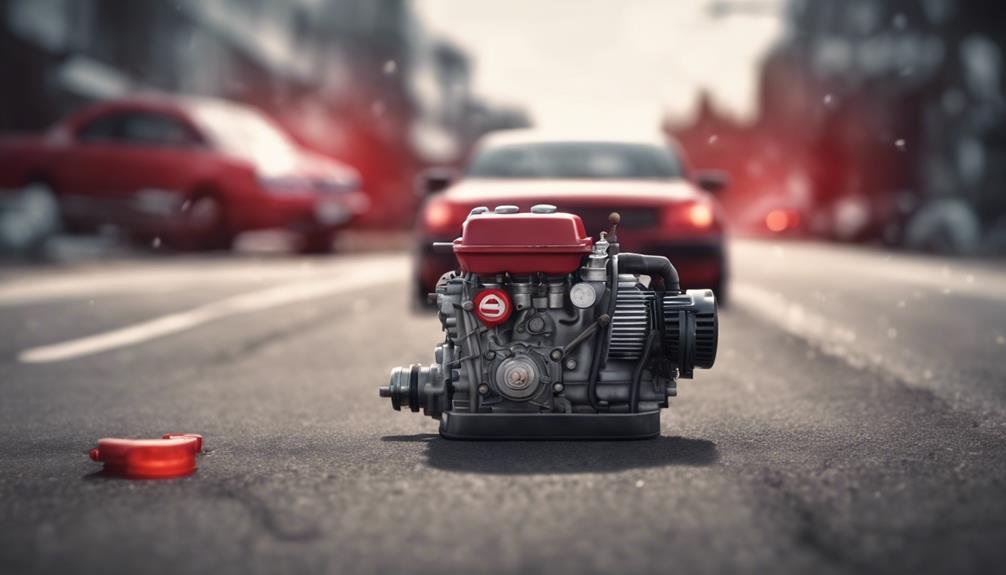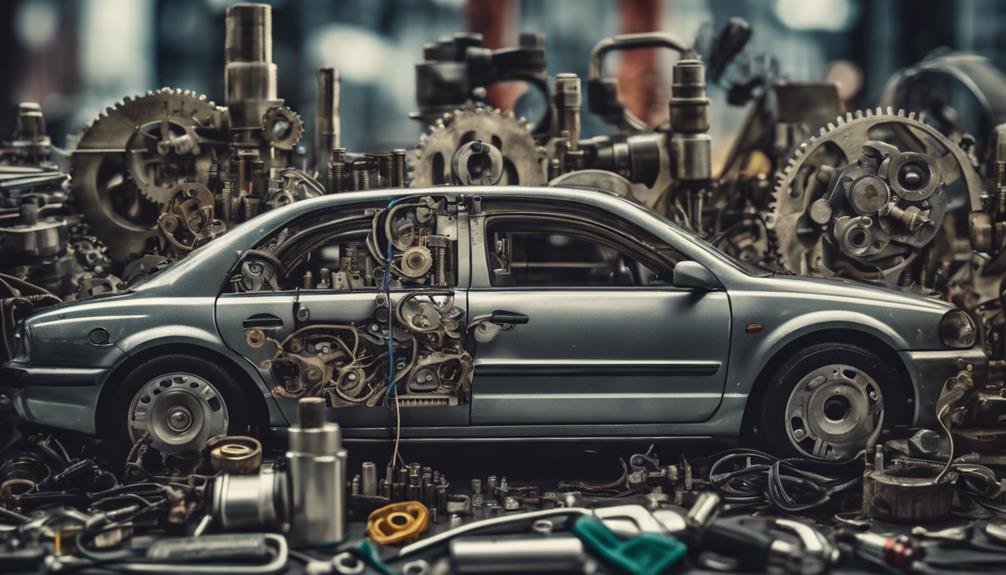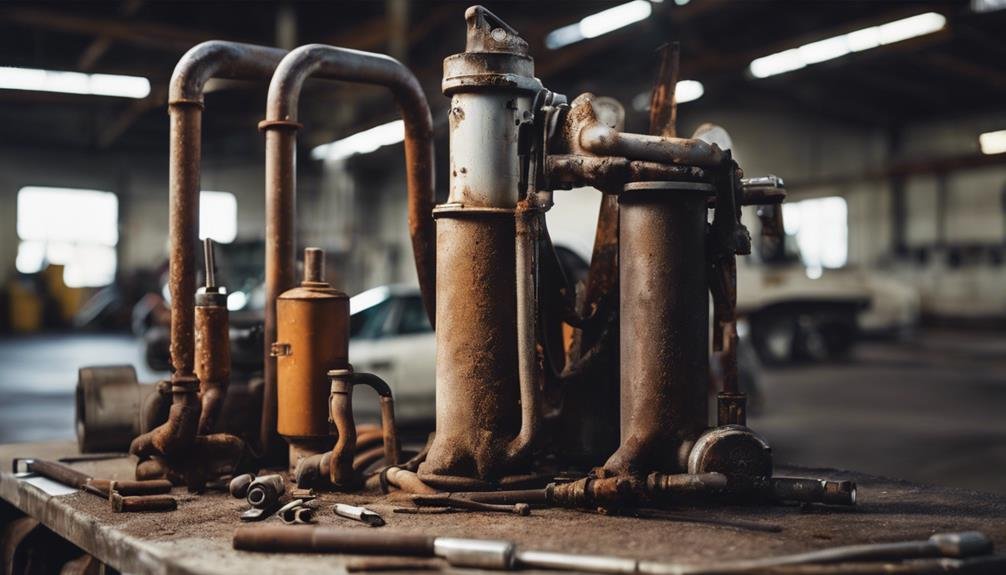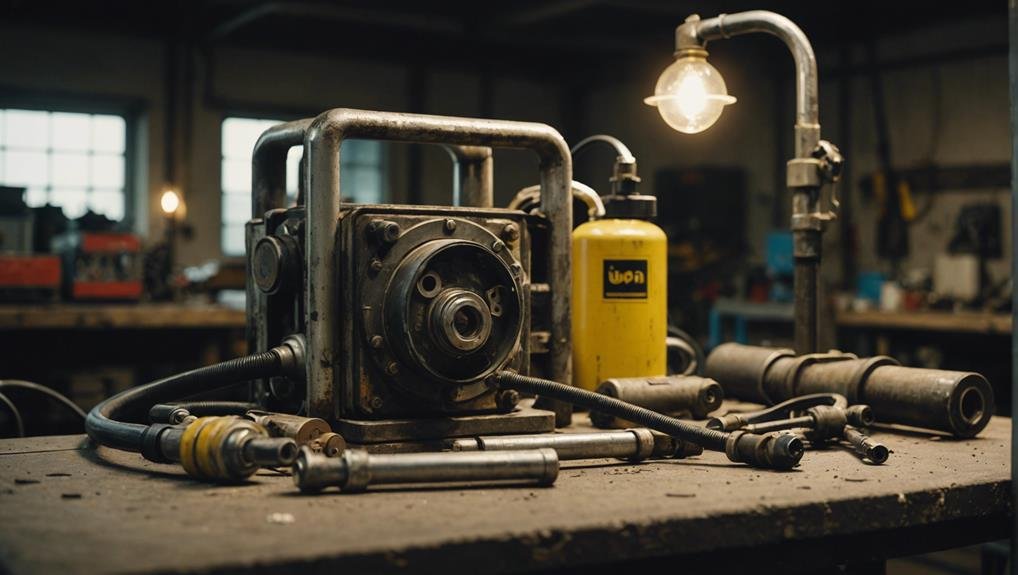When your vehicle's fuel pump fails, you can expect to pay between $750 and $1,300 for a replacement, including parts and labor, with the fuel pump part itself typically ranging in cost from $300 to $500, depending on your vehicle's make and model. Factors like geographic location, engine type, and warranty coverage can also impact the total cost. Be sure to get a detailed estimate from your mechanic before proceeding with the repair. Moreover, understanding the signs of a bad fuel pump and addressing them promptly can help prevent further engine damage – and there's more to investigate on this critical repair.
Key Takeaways
- The average cost to replace a fuel pump ranges from $750 to $1,300, covering parts and labor.
- The fuel pump part itself typically costs between $300 to $500, depending on the vehicle make and model.
- Labor costs are usually similar to the price of the replacement part, and additional costs may apply if replacing the fuel filter.
- Factors such as vehicle make, geographic location, and type of fuel pump affect the overall replacement cost.
- Considering aftermarket options, comparing quotes, and opting for refurbished or remanufactured fuel pumps can help minimize replacement costs.
Fuel Pump Replacement Costs
To make sure you're ready for the cost, get a detailed estimate from your mechanic before proceeding with the repair.
Moreover, replacing a faulty fuel pump can set you back anywhere from $750 to $1,300, a cost that includes both the replacement part and the labor required to install it. The cost of the fuel pump replacement part itself can vary from $300 to $500, depending on the make and model of your vehicle. Labor costs for fuel pump replacement are usually similar to the price of the replacement part, so you'll need to factor that in as well.
In addition, if you need to replace your fuel filter at the same time, that will add to the total cost of the repair. If you take your vehicle to a dealership for the repair, you may end up paying more than if you went to an independent mechanic. Luxury cars, in particular, tend to have higher replacement costs for fuel pumps.
Signs of a Bad Fuel Pump
As you drive, your vehicle's performance can suddenly deteriorate, signaling that your fuel pump may be on the verge of failure. A bad fuel pump can cause your engine to struggle to maintain speed, overheat, or even shut down altogether. Pay attention to signs of a bad fuel pump, including sputtering noises, backfires, and the dreaded check engine light activation.
Difficulty starting the engine or experiencing hesitation during acceleration are common symptoms of a failing fuel pump. Unusual whining noise from the fuel tank and poor fuel efficiency may also signal that your fuel pump is on its way out. If you notice any of these signs, addressing the issue promptly is crucial to prevent further engine damage.
Ignoring these warning signs can lead to costly repairs down the line. By recognizing the signs of a bad fuel pump, you can take proactive steps to replace it before it's too late.
Fuel Pump Failure Symptoms

When your vehicle's fuel pump is on the fritz, it can manifest in a variety of ways, from struggling to maintain speed to unusual noises emanating from the fuel tank. These symptoms can be frustrating and concerning, but understanding what to look for can help you address the issue promptly.
Here are some common fuel pump failure symptoms to watch out for:
- The check engine light comes on, indicating a problem with your fuel system
- Your engine is struggling to maintain speed or hesitates during start or take-off
- You notice unusual noises, like sputtering or backfires, when accelerating
- Your engine is overheating, which can lead to further damage
- You experience a lack of power when driving, making it difficult to merge or climb hills
If you're experiencing any of these symptoms, checking and replacing your fuel pump is crucial. Ignoring these warning signs can lead to further engine damage and compromise your safety on the road.
Average Fuel Pump Replacement
You're likely facing a bill of $750 to $1,300 if you need to replace your fuel pump, including both parts and labor. This average cost includes the fuel pump itself, which typically ranges from $300 to $500, and labor costs that are usually similar to the cost of the parts.
In some cases, you may need to replace the fuel filter too, which can add to the total replacement cost. If you own a luxury car or take your vehicle to a dealership for repairs, you can expect to pay even more for fuel pump replacement. The total cost will depend on the make and model of your vehicle, along with the complexity of the replacement process.
On average, you can expect to pay around $1,000 for a complete fuel pump replacement, including parts and labor. However, this cost can vary depending on your location, the type of vehicle you own, and the repair shop you choose.
Factors Affecting Replacement Cost

Several factors can drive up or bring down the cost of replacing your fuel pump, and understanding these variables is important to getting an accurate estimate for the repair.
When considering the cost to replace a fuel pump, it's vital to take into account the specifics of your car, as the make and model greatly influence the replacement cost.
Here are some key factors that can impact the total cost of fuel pump replacement:
- Vehicle make and model: The type of car you own will greatly affect the cost of replacing the fuel pump.
- Geographic location: Where you live can influence the overall price of replacing a fuel pump.
- Type of fuel pump: The type of fuel pump you choose, such as OEM or aftermarket, can impact the replacement cost.
- Engine type: Diesel engines may incur different costs compared to gasoline engines for fuel pump replacement.
- Warranty coverage: If your car is still under warranty, this may play a role in the total cost of replacing a fuel pump.
DIY Vs Professional Replacement
As you evaluate the factors impacting the cost of fuel pump replacement, you'll also need to consider who's going to do the job – you or a professional mechanic. When contemplating a DIY replacement, you'll save on labor costs, but be mindful of the risks involved, particularly when removing the fuel tank.
Improper handling of fuel system components can lead to further damage or even void your warranties. On the other hand, professional replacement guarantees safety and expertise in handling complex fuel system components. A professional mechanic won't only replace the fuel pump but also perform a thorough inspection and any necessary maintenance.
Weigh the complexity of the job against your level of expertise and consider the potential risks before deciding between DIY and professional replacement. Remember, while DIY may seem like a cost-effective option, it may end up costing you more in the long run if not done correctly.
Minimizing Fuel Pump Costs

How can you minimize the financial burden of fuel pump replacement? By taking a few proactive steps, you can reduce the cost of replacing your fuel pump.
Here are some tips to help you save:
- Consider aftermarket fuel pump options to save on replacement costs.
- Compare quotes from different mechanics or shops for the best price.
- Opt for a refurbished or remanufactured fuel pump for a more budget-friendly option.
- Look for any warranty coverage that may help offset the cost of a fuel pump replacement.
- Regular maintenance and proper fuel quality can help extend the life of your fuel pump and minimize replacement costs.
Frequently Asked Questions
Is a Fuel Pump Worth Replacing?
You're wondering if replacing the fuel pump is worth it. Honestly, if your engine's stalling or hard to start, yes, it's worth it, as a new pump will restore your car's performance and prevent further damage.
How Many Hours Does It Take to Replace a Fuel Pump?
You're wondering how long it takes to replace a fuel pump – on average, it takes you around 3 to 4 hours, depending on the complexity of the job and your mechanic's efficiency.
Is It OK to Drive With a Bad Fuel Pump?
You shouldn't drive with a bad fuel pump, as it can cause sudden power loss, engine damage, and accidents. It's not worth the risk – get it inspected and repaired promptly to guarantee your safety on the road.
What Should Be Replaced When Replacing a Fuel Pump?
When replacing your fuel pump, you should also consider replacing the fuel filter, fuel lines, mounting brackets, and fuel pump relay if necessary. Additionally, inspect the fuel tank and replace the fuel pump gasket to prevent leaks.
Conclusion
When considering replacing your fuel pump, keep in mind that costs can vary depending on factors like labor rates, make, and model. However, with an average cost of around $1,000, it's crucial to address symptoms like difficulty starting the engine, sputtering, or decreased fuel efficiency promptly.
By understanding the signs of a bad fuel pump and weighing DIY versus professional replacement, you'll be better equipped to minimize costs and get back on the road quickly and safely.
